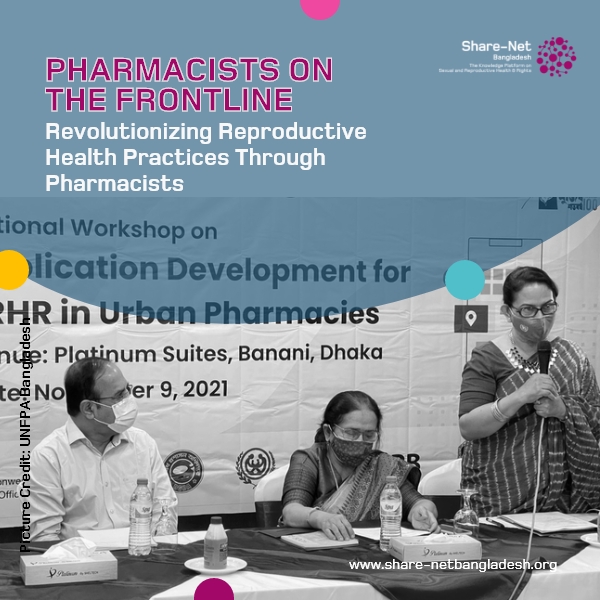Pharmacists On The Frontline: Revolutionizing Reproductive Health Practices Through Pharmacists
“Before the training, I did not understand the purpose of the emergency contraceptive pill at all,” shares Sultan Mahmud, a pharmacist from Bogura. “I would sell it like a normal contraceptive.” Sultan’s revelation highlights a critical gap in the sexual and reproductive health knowledge among pharmacists in Bangladesh. With over 536 pharmacists trained under a UNFPA-supported project, significant strides are being made to address this issue in Bogura and Bagerhat.
In a country where pharmacies are often the first point of contact for healthcare due to limited access to health facilities, responsible sexual and reproductive health practices are paramount. The Centre for Injury Prevention and Research, Bangladesh (CIPRB), recognizing this, has rolled out a project titled “Introduction of Sexual and Reproductive Health and Rights Information and Services in the Pharmacies Located in Urban Areas.” This initiative aims to equip pharmacists with the knowledge and skills needed to provide accurate sexual and reproductive health counseling, ensure safe dispensing of antibiotics, and refer clients to health facilities when necessary.
Pharmacists like Ashok Kumar from Bagerhat have found the training transformative. “Previously, I was confused about whether patients should continue to use antibiotics for the duration mentioned in the prescription even if they began to feel better,” he says. The training has reshaped his approach, emphasizing the dangers of antibiotic resistance and the importance of following prescription guidelines. “Now I know how to advise them properly. I also never dispense antibiotics without prescription anymore, especially to pregnant mothers!”
This project is not just about imparting knowledge; it’s about changing lives and improving health outcomes. For Md. Shawkot Ali from Bogura, who has been running a pharmacy for 35 years, the training opened his eyes to the critical role pharmacists can play in maternal health. “During the training, I learned about the various warning signs that could indicate something is wrong with a woman’s pregnancy,” he explains. “I am now referring my pregnant customers to nearby health facilities and educating them on the importance of antenatal care services.”
The initiative underscores the Sustainable Development Goals (SDGs) related to good health and well-being (SDG 3) and gender equality (SDG 5). By empowering pharmacists with comprehensive sexual and reproductive health knowledge, the project aims to reduce maternal mortality and ensure universal access to sexual and reproductive health services.
To ensure the long-term impact of the project, UNFPA supports CIPRB in conducting regular monitoring visits to participating pharmacies. These visits ensure adherence to the training guidelines, reinforcing the correct dispensing of antibiotics, effective sexual and reproductive health counseling, and proper utilization of referral systems with local health facilities.
“If every pharmacist in our country was trained on sexual and reproductive health, they would be able to raise awareness among the general public and refer them to health centers in case of emergency,” reflects Md. Shawkot Ali. His sentiment captures the essence of the project—empowering pharmacists to be catalysts for positive change in their communities.
The journey of pharmacists like Sultan Mahmud, Ashok Kumar, and Md. Shawkot Ali illustrates the profound impact that education and training can have on improving sexual and reproductive health practices. As these trained pharmacists continue to serve their communities, they not only enhance healthcare delivery but also contribute to a healthier, more informed society.
Source & Picture Credit: UNFPA Bangladesh


